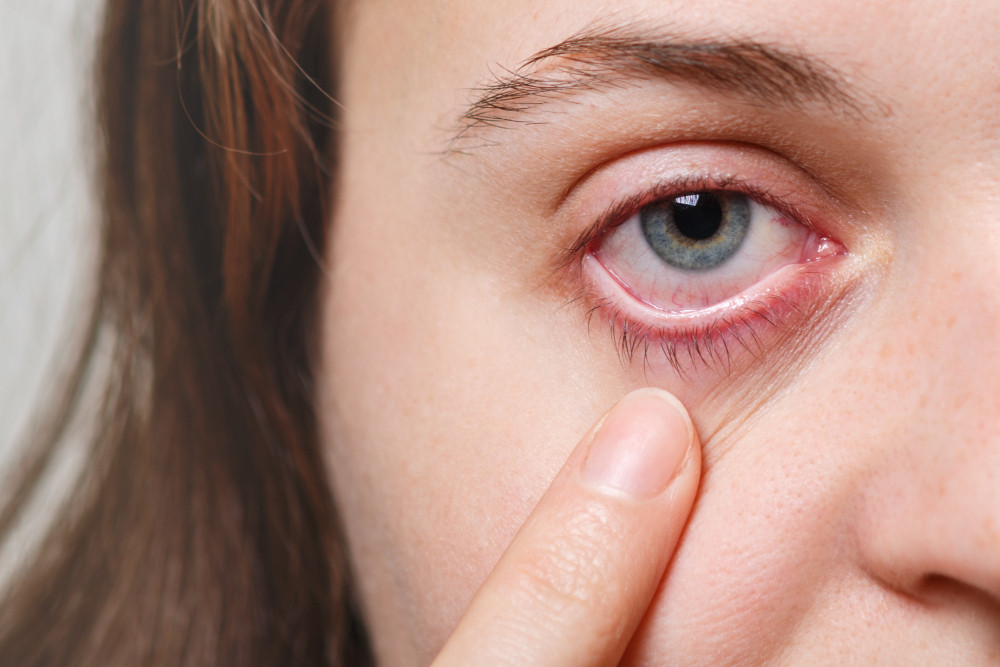Swimming is a fun activity and is beneficial for health. However, it can occasionally cause your eyes to become red and uncomfortable.
Causes of red eyes after swimming
Chlorine, a chemical commonly used in pool maintenance to kill bacteria and keep the water clean, can affect eye health when mixed with contaminants like dirt, sweat, urine, deodorant, and other substances. When chlorine combines with these elements, it forms chloramines, which can irritate the eyes. Chloramines are compounds that can make your eyes red, itchy, or watery. They can also irritate the respiratory system and skin.
The smell of chlorine in a pool indicates the presence of chloramines. Chloramines can become airborne, especially in poorly ventilated indoor pools. Poor ventilation can worsen chloramine exposure and its effects.
Outdoor pools typically have better ventilation, which results in lower chloramine gas concentrations compared to indoor pools.
Chloramines can affect health in several ways:
- Eye irritation
Chloramines cause the eyes to become red, itchy, and watery, leading to discomfort during and after swimming.
- Irritation of the respiratory tract
Inhaling chloramine vapors can irritate the nose, throat, and lungs, leading to coughing, wheezing, and breathing difficulties, especially for those with respiratory issues like asthma.
- Asthma attacks
Chloramine exposure can trigger asthma attacks or worsen existing asthma symptoms.
- Rashes and skin irritation
Direct contact with chloramines through skin or vapor exposure can cause rashes or skin irritation.
In addition to health impacts, chloramines reduce the effectiveness of chlorine as a disinfectant in swimming pools. As chloramine levels increase, the free chlorine available to kill germs and contaminants decreases, raising the risk of harmful microorganisms in the pool.
Managing red eyes after swimming
There are several ways that can be done to manage red eyes after swimming, including:
- Rinse eyes: Rinse your eyes with clean, cool water or sterile eye wash to remove chemicals and reduce irritation.
- Warm compress: Apply a warm compress to soothe the eyes and alleviate redness and discomfort.
- Eye drops: Eye drops can help lubricate and moisturize the eyes. It also helps with dryness and itching in the eyes.
- Soothing creams: Creams or ointments for sensitive skin can help relieve eye irritation and symptoms.
- Consult a doctor: If your eye condition does not improve, there is discharge from the eye, the eye is swollen, or your vision problems do not improve, see an ophthalmologist immediately.
In addition, consider wearing swimming goggles to prevent red eyes while swimming. Goggles can help protect your eyes from chlorine and other irritants.
Have questions related to eye health? You can make use of the consultation features that are available in the Ai Care application by downloading the Ai Care application from the App Store or Play Store.
Looking for more information about other diseases? Click here!
- Sean Edbert Lim, MBBS
CDC (2024). Preventing Eye Irritation from Pool Chemicals. Available from: https://www.cdc.gov/healthy-swimming/prevention/preventing-eye-irritation-from-pool-chemicals.html
Cleveland Clinic (2021). How Does Chlorine Affect Your Eyes?. Available from: https://health.clevelandclinic.org/how-does-chlorine-affect-your-eyes
Jason Howland (2023). Mayo Clinic Minute: Should you open your eyes underwater?. Available from: https://newsnetwork.mayoclinic.org/discussion/mayo-clinic-minute-should-you-open-your-eyes-underwater/
Zeke Rozell (2023). Is it bad to open your eyes in the pool?. Available from: https://www.allaboutvision.com/conditions/swimmers-eye/
Chemical Safety Facts (2022). Chlorine. Available from: https://www.chemicalsafetyfacts.org/chemicals/chlorine/











